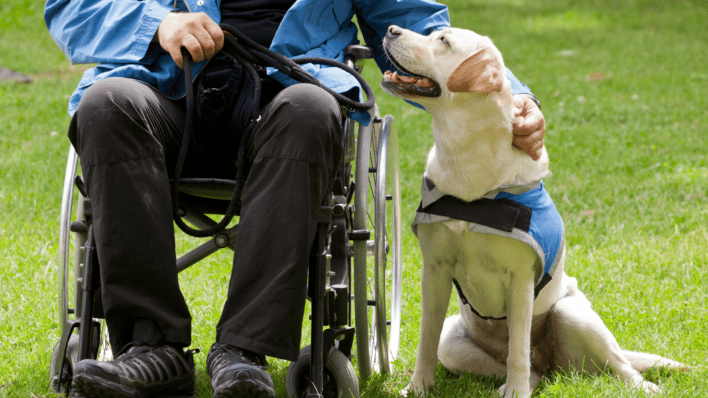Full article with thanks to: guidedogs.org.uk/getting-support/information-and-advice/travelling-with-your-assistance-dog/advice-on-entering-the-uk-for-international-visitors
The guidance below can be used by guide or assistance dog owners planning to visit the UK with a working dog. It is a summary of the preparation that should be undertaken before you reach the UK. However, guide and assistance dog owners wishing to visit the UK should contact the relevant authorities in their country for comprehensive information about UK regulatory requirements.
Health requirements for your dog when entering the UK
All dogs, including guide and assistance dogs (service dogs), entering or re-entering the UK are required to have an Animal Health Certificate or equivalent qualifying document. Dogs entering the UK are also required to have a microchip, be vaccinated against rabies, possibly blood tested, and treated for tape worm prior to arrival into the UK, after waiting an extended period of time if applicable.
The UK’s Department for the Environment, Food and Rural Affairs’ (DEFRA) website resources provide accurate and up to date information about the procedures, which you should carry out prior to entering the UK with a guide or assistance dog.
Your failure to comply with animal health requirements for the UK may result in your guide or assistance dog being placed in quarantine, for which you will be charged.
If you wish to enter the UK with your Guide or assistance dog by, for example, aircraft and require your dog to accompany you in the cabin you should provide documentary evidence that your dog is trained by an accredited training organisation which is a part of either the International Guide Dogs Federation or Assistance Dogs International.
Dogs not trained by accredited organisations are welcome in the UK, but may have to be imported into the UK in the same way as pet dogs. You will still be able to enter the UK with an unaccredited dog, but if you travel with it in the cabin of an aircraft or equivalent, you may be charged for what is technically an illegal landing.
It is your responsibility as the owner of a guide or assistance dog to ensure that your dog complies with the importation rules of the UK and other European states. European and UK law requires carriers and their agents to support you as a guide or assistance dog owner with travel, but does not expect carriers and their agents to ensure that you the owner have fully complied with the importation rules of any country.
UK Disability Rights
On entry to the UK you have the same rights to access goods, facilities and services as UK guide or assistance dog owners with partnerships. However, the majority of laws are based around civil law, so would be your responsibility to seek redress for non-compliance.
The main pieces of legislation underpinning the rights of disabled people in the UK (excluding some elements of domestic travel) are the Equality Act 2010, and the Disability Discrimination Act 1995 for visitors to Northern Ireland. Information about both acts can be found on the internet.
UK guide or assistance dog training organisations may be able to help you as a visiting guide or assistance dog owner with your enquiries. However, unless there are formal agreements through IGDF or ADI, this support may be limited, as all UK training organisations are charitably funded from public donation, so usually have limited resources.
Full article with thanks to: guidedogs.org.uk/getting-support/information-and-advice/travelling-with-your-assistance-dog/advice-on-entering-the-uk-for-international-visitors
We offer free advice on pet travel within or outside the UK, so whether you’re looking for worldwide pet travel services or European travel – we give you our honest, expert advice.
If you choose us for pet travel, don’t worry – your animal companion will be in safe hands from start to finish.
Simply get a quote from us for more information.

